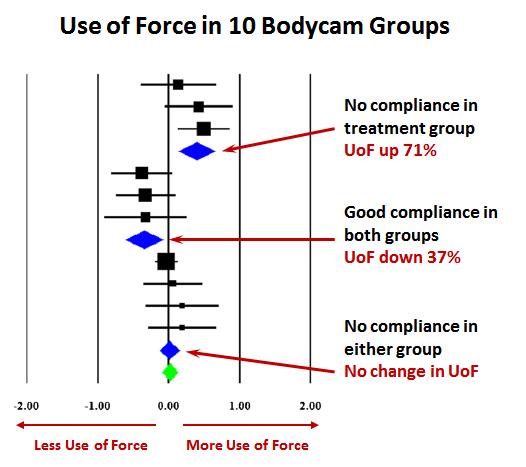Do bodycams reduce the use of force by police officers? In the previous post, I wrote about a recent study in which the headline said bodycams had no effect but the study itself said they had a huge effect. What’s going on?
Answer: there were two studies by the same group. The first one looked at the overall data from ten police departments and concluded that bodycams had little effect. The second study broke the police departments into those that followed the experimental protocol and those that didn’t. This is from the second study:
We present results from preplanned subgroup analyses on the efficacy of the treatment for particular groups of interest, in a pre-specified manner. We did not perform these analyses when presenting the preliminary main effects in Ariel et al. (2016), as the data we were interested in—police officers’ discretion—were not available at the time.
Here are the basic results. The treatment groups are supposed to keep their bodycams on at all times when they’re interacting with the public. The control groups are supposed to keep their bodycams off at all times:

So there you have it. The authors conclude:
Given our preliminary findings, we think that there is a clear route for…improving the implementation of BWCs around the world: cameras should remain on throughout the entire shift—that is, during each and every interaction with citizens—and should be prefaced by a verbal reminder that the camera is present. We argue that the verbal reminder delivered by the officer wearing the camera provides a mechanism to remind that ‘rules of conduct’ are in play—common courtesy from officer and citizen for one, and potentially a legal requirement given the weight of privacy sensitivities in the public domain.
I continue to have some doubts about the sheer size of the effect here, which is pretty unprecedented in real-world interventions like this. It’s also worth noting that the big difference in use of force comes from only three police departments: those that followed the experimental protocol faithfully. This small sample size opens up the possibility that these police departments were different in some way other than the fact that they followed the experimental protocol. Perhaps they had better leadership to begin with, and that’s why officers did what they were supposed to do?
Nonetheless, interesting stuff. It certainly provides an obvious avenue for follow-up studies, and it deserves more play than the first study. Perhaps someone should ask Donald Trump what he thinks of bodycams. That seems to be the only sure-fire way of getting the media’s attention these days.














